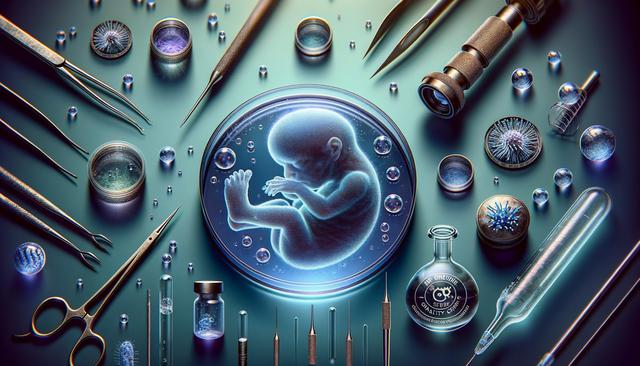What is IVF and How Does It Work?
IVF, or in vitro fertilization, is a medical procedure that assists with conception by combining an egg and sperm outside the body. This process involves several carefully coordinated steps, beginning with hormone therapy to stimulate the ovaries. Once the eggs are mature, they are retrieved and fertilized with sperm in a laboratory. After a few days of development, one or more embryos are transferred into the uterus with the hope of achieving a successful pregnancy.
The procedure has evolved significantly since it was first introduced, with advancements that have improved outcomes and accessibility. IVF is now used in a wide range of fertility scenarios, including unexplained infertility, age-related fertility decline, male factor infertility, and genetic disorders. It is also a common option for same-sex couples and individuals seeking to become parents.
Key stages of IVF include:
- Ovarian stimulation using fertility medications
- Egg retrieval through a minor surgical procedure
- Fertilization in a laboratory setting
- Embryo culture and monitoring
- Embryo transfer into the uterus
Each stage of IVF requires careful timing and medical oversight to maximize the chances of success while minimizing risks.
Who Might Consider IVF?
IVF is often considered by individuals and couples who have faced difficulties conceiving naturally. While not the first option for everyone, it becomes a viable path after other methods, such as fertility drugs or intrauterine insemination (IUI), have not been successful. It is also sought after when specific medical conditions affect fertility.
Situations in which IVF might be recommended include:
- Blocked or damaged fallopian tubes
- Endometriosis
- Male infertility, such as low sperm count or poor sperm mobility
- Ovulation disorders
- Genetic conditions that might be passed to a child
Women over the age of 35 may also consider IVF, as fertility tends to decline with age. The procedure offers an opportunity to use donor eggs or sperm, which can be beneficial in cases of diminished ovarian reserve or for single parents and LGBTQ+ families.
Consulting with a reproductive endocrinologist can help determine whether IVF is an appropriate option based on medical history, age, and fertility goals.
Preparing for IVF: What to Expect
Preparation for IVF involves physical, emotional, and financial readiness. Before starting the process, patients typically undergo a series of tests, including hormone evaluations, ultrasounds, and semen analysis. These assessments help physicians tailor the treatment plan to the specific needs of the patient.
Emotional preparation is equally important. IVF can be a physically demanding and emotionally taxing journey. It’s essential for individuals and couples to have access to mental health support, whether through counseling, support groups, or informal networks of friends and family.
Financial considerations should not be overlooked. IVF can be costly, and insurance coverage varies significantly. Some clinics offer payment plans or financing options to help make the procedure more accessible. It’s advisable to review all associated costs, including medication, lab work, and potential additional procedures like embryo freezing.
Tips for preparing for IVF include:
- Maintaining a healthy lifestyle (balanced diet, regular exercise, avoiding alcohol and tobacco)
- Managing stress through mindfulness or therapy
- Understanding the timeline and setting realistic expectations
- Discussing all questions and concerns with your fertility team
Being well-informed and supported can make a significant difference throughout the IVF experience.
Understanding the Risks and Success Rates
While IVF has helped many individuals achieve parenthood, it is important to be aware of the potential risks and challenges. Success rates can vary based on factors such as age, overall health, and the cause of infertility. Younger individuals tend to have higher success rates, but this can still differ widely among clinics and individual cases.
Some of the risks associated with IVF include:
- Ovarian hyperstimulation syndrome (OHSS), a condition resulting from excessive response to fertility drugs
- Multiple pregnancies if more than one embryo is transferred
- Emotional stress and disappointment if the cycle is not successful
- Side effects from medication, such as mood swings, bloating, or headaches
It is also worth noting that not all IVF cycles result in pregnancy, and some may require multiple attempts. This can be physically and emotionally challenging, underscoring the importance of support and resilience during the process.
Understanding success rates and discussing them openly with your healthcare provider can help set realistic goals. It also allows patients to explore complementary options, such as using donor gametes or considering embryo adoption.
Looking Ahead: Life After IVF
For those who achieve pregnancy through IVF, the journey continues with regular prenatal care and monitoring, especially in the early weeks. IVF pregnancies are generally similar to other pregnancies, but in some cases, they may be categorized as high-risk depending on the individual’s health history or age.
For others, if IVF does not lead to pregnancy, it may be necessary to consider further cycles or alternative family-building options such as surrogacy or adoption. Emotional healing and future planning play a crucial role at this stage, and mental health support remains vital.
Important points to consider after IVF:
- Regular medical follow-ups to monitor pregnancy or plan next steps
- Open communication with partners or support networks
- Exploring additional fertility treatments if needed
- Focusing on self-care and emotional well-being
IVF is not just a medical procedure—it’s an emotional and life-changing journey. Whether it leads to a growing family or opens the door to new possibilities, it often leaves individuals stronger and more informed about their reproductive health.








